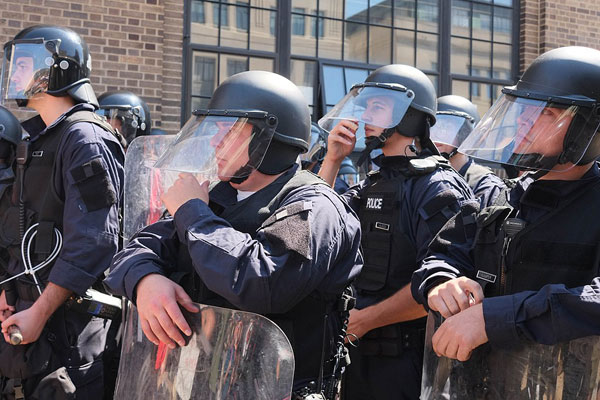
Tools of justice can become inconvenient for those in power when people become comfortable wielding them. That seems to be the message of the motion filed by the St. Louis police department last week asking to lift a restriction on the use of chemical agents like mace and pepper spray.
Let’s start at the beginning: In September 2017, a white police officer named Jason Stockley was acquitted of the murder of Anthony Lamar Smith, who was black and suspected of drug offenses. Weeks of demonstrations in St. Louis followed, and some protestors threw bricks and bottles at police. About 300 people were arrested, but most germane to this situation, about 100 people “testified that they were surrounded [in a process of being corralled known as “kettling”], beaten, pepper-sprayed, and taunted as they kneeled or laid on the ground,” according to Jay Connor at The Root.
The American Civil Liberties Union (ACLU) filed suit against the city “for retaliating against persons engaging in First Amendment-protected activity; for interfering with the right to record police officers in public places; for unreasonably seizing them and applying excessive force; and for violating procedural due process rights by kettling and gassing and spraying them with chemical agents designed to cause pain and confusion without constitutionally adequate warning.”
While a final decision has not yet been reached, District Judge Catherine Perry granted a preliminary injunction against the city that, among other things, limited police officers’ ability to deploy chemical agents. She wrote, “Officers have exercised their discretion in an arbitrary and retaliatory fashion to punish protesters for voicing criticism of police or recording police conduct” and opined that the defendants had a good chance of persuading a jury that this was a habitual activity. The injunction prevents the city from declaring “unlawful assembly” unless there is an actual threat of violence, and regulates the use of chemical agents. (The city’s motion last week complained that protestors had no permit to assemble, but as Judge Perry pointed out, “the City of St. Louis does not require, and will not provide, a permit for protests.”)
Last week, the city filed its own motion to reverse that injunction, so that police may deploy chemical agents as they see fit. “The streets of the City of St. Louis during September 2017 were not the Edmund Pettus Bridge,” says the motion, “much as the ACLU and its plaintiffs want the Court to react as though they were.”
Sign up for our free newsletters
Subscribe to NPQ's newsletters to have our top stories delivered directly to your inbox.
By signing up, you agree to our privacy policy and terms of use, and to receive messages from NPQ and our partners.
The motion claims that the ACLU has “inveigled the Court into improvident intrusion into police practices in the City of St. Louis.” That’s insulting enough (to inveigle is to “persuade [someone] to do something by means of deception or flattery,” something the courts generally try to avoid), but the motion also claims that because St. Louis did not erupt into full-scale violent riots, “the community (including plaintiffs, though they may not realize it) owes a debt of gratitude to the vast majority of St. Louis police officers.” No doubt there are many times the St. Louis police provided a service for which citizens might be grateful, but this is not one of those times and the protestors were certainly not grateful to be “drowning in mace,” as one person described it.
What does “improvident intrusion,” the basis of the city’s complaint, really mean? The motion cites “numerous” suits filed against the city related to the “same conduct” at issue in the ACLU’s suit. (The New York Times reports that nearly two dozen lawsuits have been filed.) This seems to be the main complaint; the motion explains that “the numerous damage suits now pending against defendant City, including actions brought by former plaintiffs in this case, reinforce the conclusion that equitable jurisdiction is lacking in this case.” The city also cited previously unknown evidence (they motion accuses the ACLU of “telescoping” evidence to support their claims) and the fact that St. Louis has experienced no violent riots since 2017. However, the only result of reversing the injunction would be to permit the police greater license to crack down on protests.
Erin White of Afropunk sensibly pointed out, “Kinda weird that they’re fighting so hard to regain what has [been] determined to be abusive tactics instead of finding safer alternatives for dealing with the community.”
True, if the only issue at play here were their ability to manage community disruption. But reversing an injunction like this would make a statement about the ability of courts to dictate police behavior, about who’s in charge of ensuring justice. That debate is painfully ironic, considering the original cause of the protest was the failure of courts to provide justice in a case of police violence. But where gains have been found, such as in Judge Perry’s original injunction, they must be actively preserved.—Erin Rubin













